Republican Bill Would Shield Police From John Doe Investigations
Officer Joseph Mensah, involved in 3 fatal shootings, testifies against Doe probes.
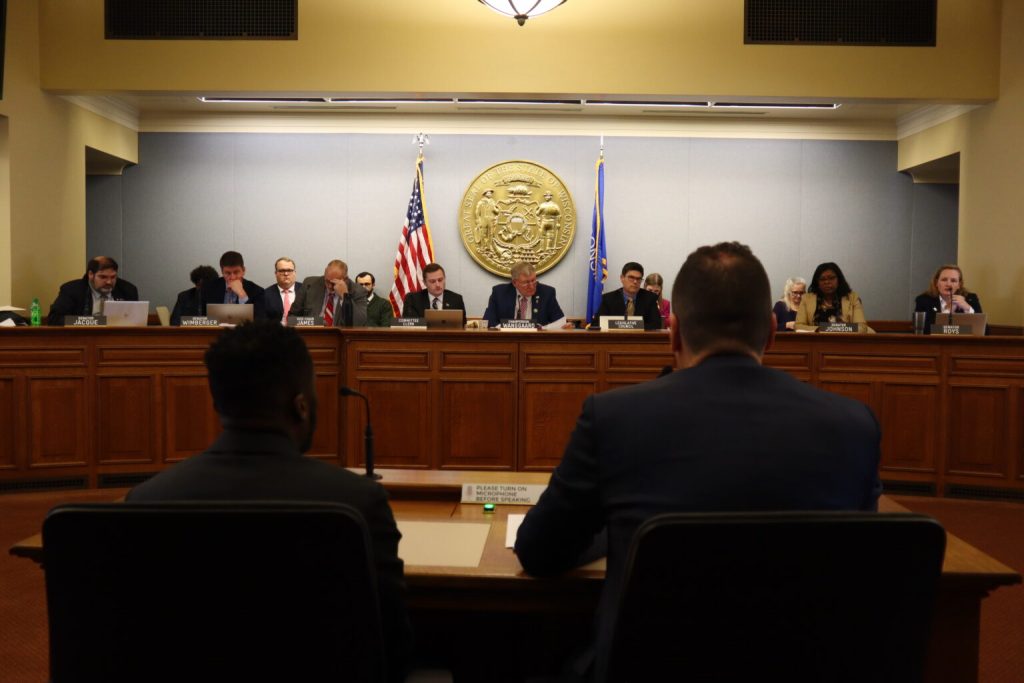
The Senate Committee on Judiciary and Public Safety. Seated at the table are Detective Joseph Mensah (left) and Wisconsin Fraternal Order of Police President Ryan Windorff (right) (Photo by Isiah Holmes/Wisconsin Examiner)
“Baseless,” “false allegations,” and “meant to harass” were phrases used by Republican senators and police groups to describe what they called the “abuse” of Wisconsin’s John Doe law to exact vengeance on police officers who were involved in fatal incidents.
“Activists have discovered that the John Doe process itself can be the punishment they seek against innocent law enforcement officers in our community,” said Sen. Rob Hutton (R-Brookfield) during a Thursday afternoon hearing of the Senate Judiciary and Public Safety Committee.
It was the second time Hutton has introduced a bill taking aim at Wisconsin’s John Doe law. The law, which applies to a wide range of crimes, allows a judge to review cases in which prosecutors have declined to file charges. A judge then decides whether probable cause for a crime exists. If so, then the judge may appoint special prosecutors to consider whether charges are needed. Hutton’s bill seeks to limit the law’s use against officers involved in fatal shootings.
Hutton, calling the the law “archaic,” said that it’s “being often used with more frequency against police officers.” Any person or group can file a complaint with a court and request the initiation of a John Doe process, he said. If passed, Hutton’s bill would prevent the John Doe law from being used in cases where there is no new or “unused” evidence and where prosecutors already decided that a officer acted in self-defense.
Although Hutton didn’t clarify what might count as “new” or “unused” evidence, he did talk at length about his conversations with police officers. The senator described going on ride-alongs and watching officers respond to domestic violence calls, “legally going 90 miles per hour” to respond to emergencies, and how disrespected and criticized officers often felt. Hutton described having conversations with officers who said they felt more “timid” and feared being charged for something like a fatal shooting. Many officers, Hutton said, are leaving the job at a time when some agencies struggle with understaffing.
Hutton said that two recent John Doe hearings involving police shootings have further damaged morale. A 2021 hearing reviewed the shooting of 25-year-old Jay Anderson Jr. by then-Wauwatosa Police officer Joseph Mensah. In 2016 Anderson, who was sleeping in his car in a park late at night when Mensah approached him, was the second person Mensah had fatally shot within a year. Over his five-year career at Wauwatosa PD Mensah was involved in three fatal shootings. Anderson, who Mensah said was reaching for a gun when he shot him, was the only person Mensah’s shot whose killing triggered a John Doe hearing.
Another John Doe hearing in 2023 looked into the killing of Tony Robinson by Madison Police officer Matthew Kenny. The 19-year-old was killed in his apartment after officers responded to reports that he was acting erratically. His family was awarded a $3.3 million settlement in 2017, the largest for a police shooting in Wisconsin history at the time.
Neither of the John Doe hearings succeeded, however. Although probable cause was found in Mensah’s case for homicide by negligent use of a dangerous weapon, special prosecutors declined to pursue charges. A judge declined to continue with Kenny’s case. Hutton referred to both hearings as a growing problem, but the Mensah and Kenny cases were the only two the senator and police lobbyists said they were aware of. Hutton pointed to Mensah, who attended the Thursday hearing to offer testimony, as the inspiration for the bill to limit John Doe proceedings.
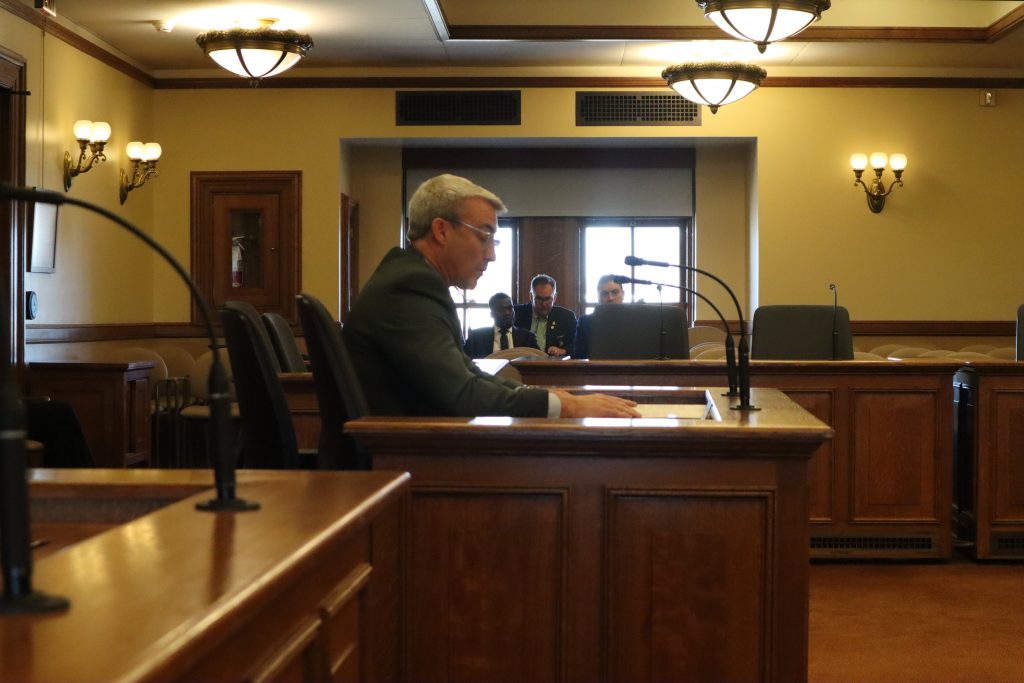
Rep. Rob Hutton (R-Brookfield), to his left sits Joseph Mensah, formerly of the Wauwatosa Police Department and now a Waukesha County Sheriff Department detective. (Photo by Isiah Holmes/Wisconsin Examiner)
Other Republicans on the committee appeared supportive of changing the John Doe law. Sen. Andre Jacque (R- DePere) likened its use to “attacks on qualified immunity” for police, and Sen. Van Wanggaard (R-Racine) — committee chairman and a former police officer — as well as Sen. Jesse James (R-Altoona), another law enforcement official, and police lobbyists, stressed that officers need to be able to act without hesitation.
Committee Democrats, however, were not sold. Sen. Dora Drake (D-Milwaukee), questioned the imbalance of power within the criminal justice system that the bill could create, and wondered whether Hutton had talked to representatives of the State Bar of Wisconsin, which is opposed to the bill. Hutton said he had not. Hutton described those bringing John Doe cases against officers as seeking to “demonize someone in law enforcement.” Whereas the American Civil Liberties Union (ACLU) of Wisconsin and the Wisconsin State Bar registered against the bill, two Wisconsin police associations and the State Lodge Fraternal Order of Police registered in support.
Under the microscope
Mensah’s shooting of Anderson was investigated by the Milwaukee Police Department before the John Doe. Their investigation in 2016 was reviewed by Milwaukee County District Attorney John Chisholm, who declined to charge Mensah. A separate civil rights review, and internal Wauwatosa PD review, were also conducted. In 2020, an independent investigator also found that Mensah had violated multiple department policies when he did a radio show interview. Hutton called the use of the John Doe law against police officers as “a gap that needs to be sewn up and closed.”
After the hearing was over, Hutton told Wisconsin Examiner that although he’s talked extensively with police officers and their families, that he has not spoken with family members of anyone killed by police, such as those in Mensah’s shootings. “I haven’t heard from any of them,” Hutton said of the Anderson family and other relatives of those killed by Mensah. “I would love to have conversations with any of them in that regard, I have not had any conversation with them at this point.”
Sen. Kelda Roys (D-Madison) said that she was “troubled by the callousness” of the discussion of Hutton’s bill. Roys said police officers and the people they kill, as well as the family members of the deceased, are victims of a tragic situation. “You have to have accountability,” said Roys. “People need to be able to trust law enforcement.” Sen. LaTonya Johnson (D-Milwaukee) pointed out that John Doe hearings involving police officers are infrequent.
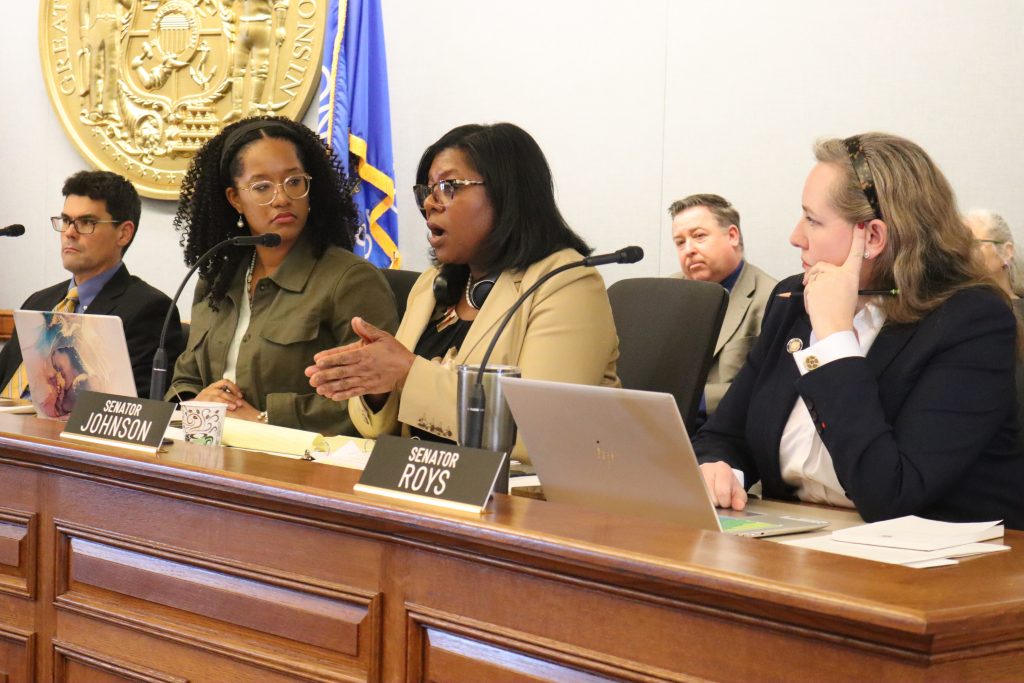
Sen. LaTonya Johnson asks questions during a Senate committee hearing. (Photo by Isiah Holmes/Wisconsin Examiner)
Ryan Windorff, president of the Wisconsin Order of Police, called the allegations made during John Doe hearings “baseless.” Windorff said the hearings came into vogue after what he called an “anti-police movement” which had “infected” the country. Windorff said investigations are transparent, and that while families have rights, those rights do not “usurp” the ability of police officers to defend themselves.
Mensah also testified at the hearing. In 2020, Mensah resigned from the Wauwatosa PD after being suspended by the Police and Fire Commission. He was later hired by the Waukesha County Sheriff’s Department, where he said he underwent “a unique hiring process.” Besides a background check, the sheriff and Defensive and Arrest Tactics (DAAT) experts did their own review, which he passed. Nevertheless, Mensah said that other agencies had been unwilling to hire him because of “publicly-made…available information.” He added that the only public information besides police reports is the news, about which he said, “they have their right, they can be biased if they want.”
Mensah described the investigations and scrutiny after his three fatal shootings as “a constant drain.” He said that a John Doe proceeding could be brought “literally for anything,” and that he lives knowing that he could be charged with a crime any day. Mensah said police “aren’t granted the same protections and the same benefit of the doubt, or anything.”
“Unfortunately now, the way the law is written, the scale is heavily not in our favor,” said Mensah.
He also took aim at the protests that focused on him in 2020 and 2021. Mensah said he didn’t understand why protesters demonstrated at the home of the woman he has since married and his parents’ house, chanting Black Lives Matter when he is a Black officer himself. “My race was completely stripped from me. I was no longer considered Black. I was considered just an officer,” he said.
The protests and hearings were difficult to explain to his family and kids, Mensah added. “There’s been clear civil rights violations against myself, no one cares,” said Mensah. “No one cares when it’s violations against my children. No one cares when it’s violations against my wife.” Mensah’s wife, whose maiden name is Patricia Swayka, is a former Milwaukee police officer. In 2024, she appeared on a “Brady list” of officers with problematic histories obtained by TMJ4 through records requests.
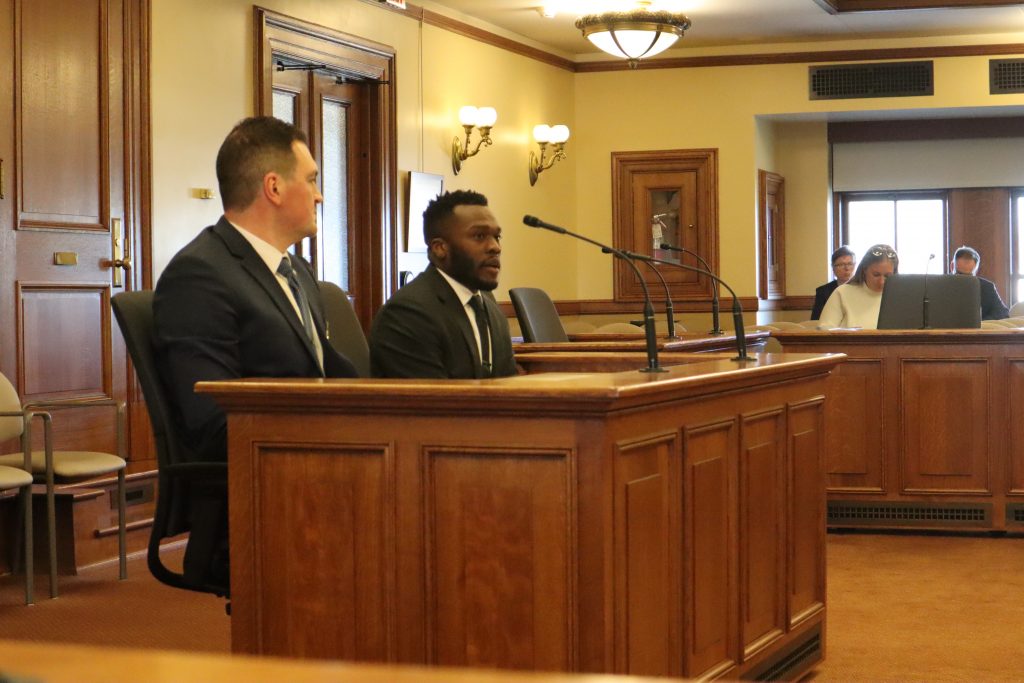
Detective Joseph Mensah testifies before the Senate Committee on Judiciary and Public Safety. (Photo by Isiah Holmes/Wisconsin Examiner)
Mensah added that “this has been just a cold, calculated process of just harassing me, harassing my family, and using this law to take advantage of it. And there needs to be some type of change before it happens to someone else.”
Mensah talked about a protest outside his house that escalated into a confrontation, in which a protester brought a gun and fired it. Several protesters were arrested for the incident, and three were charged with either handling, firing, or transporting a shotgun. Wauwatosa PD, the FBI, and Milwaukee PD specialized units all helped investigate the incident.
During the hearing, Mensah said that the judge in his John Doe hearing “got it wrong” and that “the system as we have it is flawed, and people are using it not to get justice, but to get revenge. And specifically revenge against me.” Mensah said that he used to be a “very proactive” officer, and that Anderson’s shooting occurred when he was more proactive on the job.
Mensah told the Senate committee “I did not have a chance to defend myself,” during the John Doe hearings. “Anytime something was brought up, I couldn’t question it.” According to court filings from the hearing, however, Mensah pleaded the Fifth Amendment, since he was subject to criminal charges. After the Senate committee hearing when asked about this, Mensah said “I honestly don’t remember.” He told Wisconsin Examiner that “I was instructed that we weren’t allowed to say anything in that hearing.” Mensah vaguely recalled “some mention of it,” referring to his Fifth Amendment pleading. “I honestly don’t remember if I did, or if there was questions about what if it got to a certain point.”
When asked how the Anderson shooting was misrepresented by Anderson’s family and their lawyers, Mensah recalled people saying “I shot him 13 times in the back,” which wasn’t correct. Elsewhere Mensah saw people mistaking his ethnicity. “I get it…You can only report what you know…What you’re told, what you find out. Some stuff’s true, some stuff isn’t. Some stuff’s intentional, some stuff’s not. I can’t say what isn’t intentional, and what’s not. At the same time, it’s kind of like in law enforcement, if I’m interviewing someone and they tell me something, I can only take that at face value and put it forward.”
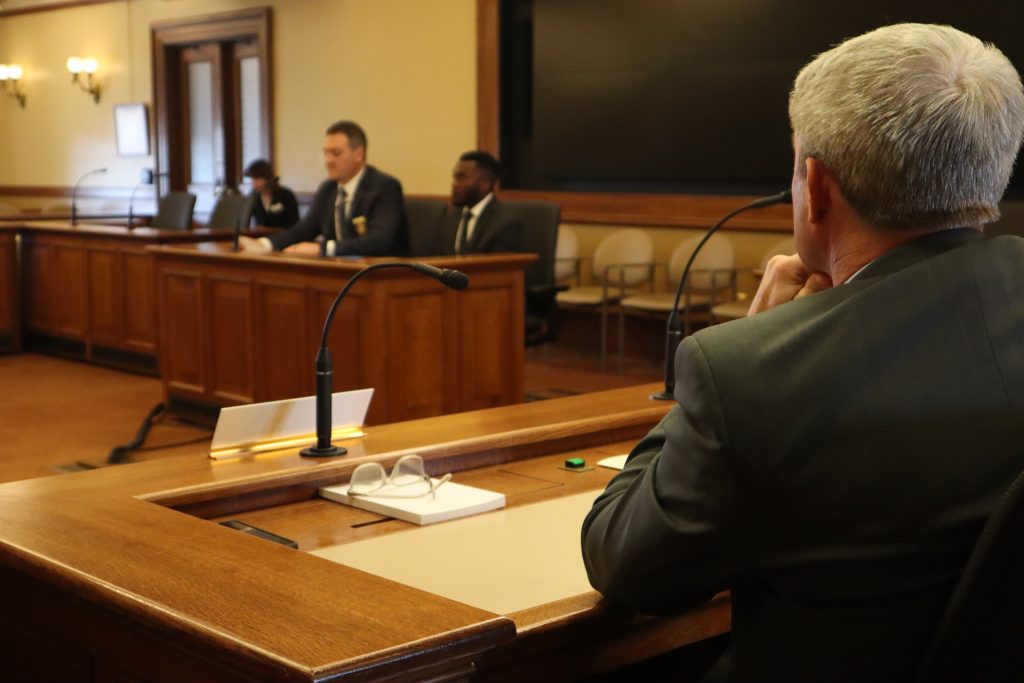
Rep. Rob Hutton (R-Brookfield) watches as Detective Joseph Mensah testifies to the Senate committee. (Photo by Isiah Holmes/Wisconsin Examiner)
Asked whether he felt that his career in the Waukesha Sheriff’s Department had been negatively affected, he said, “All I know is I applied for the detective position, I got it. I applied for a lieutenant position, didn’t get that.”
“In some ways I’ve been promoted, in some ways I haven’t,” he said.
Democratic Sens. Johnson and Drake expressed skepticism in comments after the hearing.
Johnson compared the John Doe bill to Republican efforts to impose stricter regulations on bail and parole, arguing that judges need more authority to keep violent offenders incarcerated. Yet Hutton’s John Doe bill, she pointed out, takes away discretion and power from judges.
“It really boils down to who we decide are victims,” said Drake.
Bill to protect police from John Doe cases gets a hearing was originally published by Wisconsin Examiner.






















Mensah should be ashamed of himself for portraying himself as a victim with no remorse for the lives he took and the impact on families. His Mensah family is better than that in terms of compassionate support for our community. He is not a victim!
No money for state crime laws, and we see this proposal?
Why would a police officer fear an investigation of a shooting?
Why not have all police shootings go to trial? If everything is done right, there is nothing to worry about, and the community sees that twelve members of the community agree that the shooting was justified.
I’m confused as to why the police would want less. There would be no confusion as to what happened. The police officer would be officially cleared of any wrong doing. What is wrong with that approach?
When someone is given a weapon, there should be training and – real training. Have you seen police officers who were overweight? Are they trained in self-defense? What about de-escalation? Is it always two shots center-mass? In South Korea, the first round is a blank. Could the first round be non-lethal?